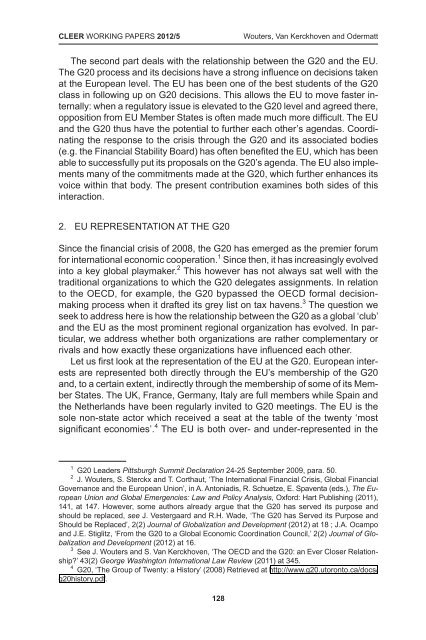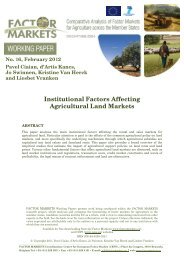Principles and practices of EU external representation - Asser Institute
Principles and practices of EU external representation - Asser Institute
Principles and practices of EU external representation - Asser Institute
You also want an ePaper? Increase the reach of your titles
YUMPU automatically turns print PDFs into web optimized ePapers that Google loves.
CLEER WORKING PAPERS 2012/5Wouters, Van Kerckhoven <strong>and</strong> OdermattThe second part deals with the relationship between the G20 <strong>and</strong> the <strong>EU</strong>.The G20 process <strong>and</strong> its decisions have a strong influence on decisions takenat the European level. The <strong>EU</strong> has been one <strong>of</strong> the best students <strong>of</strong> the G20class in following up on G20 decisions. This allows the <strong>EU</strong> to move faster internally:when a regulatory issue is elevated to the G20 level <strong>and</strong> agreed there,opposition from <strong>EU</strong> Member States is <strong>of</strong>ten made much more difficult. The <strong>EU</strong><strong>and</strong> the G20 thus have the potential to further each other’s agendas. Coordinatingthe response to the crisis through the G20 <strong>and</strong> its associated bodies(e.g. the Financial Stability Board) has <strong>of</strong>ten benefited the <strong>EU</strong>, which has beenable to successfully put its proposals on the G20’s agenda. The <strong>EU</strong> also implementsmany <strong>of</strong> the commitments made at the G20, which further enhances itsvoice within that body. The present contribution examines both sides <strong>of</strong> thisinteraction.2. <strong>EU</strong> <strong>representation</strong> at the G20Since the financial crisis <strong>of</strong> 2008, the G20 has emerged as the premier forumfor international economic cooperation. 1 Since then, it has increasingly evolvedinto a key global playmaker. 2 This however has not always sat well with thetraditional organizations to which the G20 delegates assignments. In relationto the OECD, for example, the G20 bypassed the OECD formal decisionmakingprocess when it drafted its grey list on tax havens. 3 The question weseek to address here is how the relationship between the G20 as a global ‘club’<strong>and</strong> the <strong>EU</strong> as the most prominent regional organization has evolved. In particular,we address whether both organizations are rather complementary orrivals <strong>and</strong> how exactly these organizations have influenced each other.Let us first look at the <strong>representation</strong> <strong>of</strong> the <strong>EU</strong> at the G20. European interestsare represented both directly through the <strong>EU</strong>’s membership <strong>of</strong> the G20<strong>and</strong>, to a certain extent, indirectly through the membership <strong>of</strong> some <strong>of</strong> its MemberStates. The UK, France, Germany, Italy are full members while Spain <strong>and</strong>the Netherl<strong>and</strong>s have been regularly invited to G20 meetings. The <strong>EU</strong> is thesole non-state actor which received a seat at the table <strong>of</strong> the twenty ‘mostsignificant economies’. 4 The <strong>EU</strong> is both over- <strong>and</strong> under-represented in the1 G20 Leaders Pittsburgh Summit Declaration 24-25 September 2009, para. 50.2 J. Wouters, S. Sterckx <strong>and</strong> T. Corthaut, ‘The International Financial Crisis, Global FinancialGovernance <strong>and</strong> the European Union’, in A. Antoniadis, R. Schuetze, E. Spaventa (eds.), The EuropeanUnion <strong>and</strong> Global Emergencies: Law <strong>and</strong> Policy Analysis, Oxford: Hart Publishing (2011),141, at 147. However, some authors already argue that the G20 has served its purpose <strong>and</strong>should be replaced, see J. Vestergaard <strong>and</strong> R.H. Wade, ‘The G20 has Served its Purpose <strong>and</strong>Should be Replaced’, 2(2) Journal <strong>of</strong> Globalization <strong>and</strong> Development (2012) at 18 ; J.A. Ocampo<strong>and</strong> J.E. Stiglitz, ‘From the G20 to a Global Economic Coordination Council,’ 2(2) Journal <strong>of</strong> Globalization<strong>and</strong> Development (2012) at 16.3 See J. Wouters <strong>and</strong> S. Van Kerckhoven, ‘The OECD <strong>and</strong> the G20: an Ever Closer Relationship?’43(2) George Washington International Law Review (2011) at 345.4 G20, ‘The Group <strong>of</strong> Twenty: a History’ (2008) Retrieved at http://www.g20.utoronto.ca/docs/g20history.pdf.128








